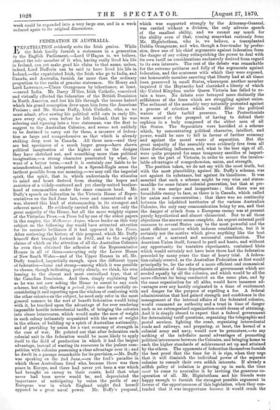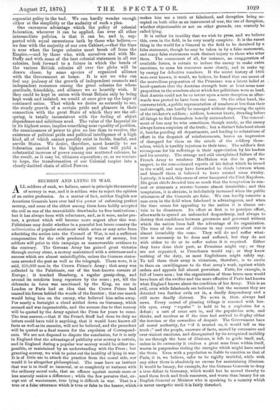FEDERATION IN AUSTRALIA.
EXPATRIATION evidently suits the Irish genius. While the Irish hardly furnish a statesman in a generation to the English Parliament,—Lord O'Hagan is, we believe, almost the sole member of it who, having really lived his life in Ireland, can yet make good his claim to that name, unless, indeed, Lord Dufferin can be said to have lived his life in Ireland,—the expatriated Irish, the Irish who go to India, and Canada, and Australia, furnish far more than the ordinary proportion to the ranks of genuine statesmen. Sir Henry and Lord Lawrence,—Ulster Orangemen by inheritance, at least, —saved India. Mr. Darcy NU Gee, Irish Catholic, conceived and virtually effected the federation of the British Dominion in North America, and lost his life through the insane hatred which his grand conception drew upon him from the American Fenians ; and Mr. Gavan Duffy, Irish Catholic, who, as we must admit, after sowing his political wild oats in early life, gave every sign, even before he left Ireland, that he was sobering and ripening into a true statesman, was the first to suggest to the Australian Colonies, and seems not unlikely to be destined to carry out for them, a measure of federa- tion as large and comprehensive as that which is already striking deep root in Canada. All these men—and they are but specimens of a much larger group—have shown political imagination of the higher cast in the designs they have sketched out, and something more than political imagination,—a strong character penetrated by what, for want of a better term,—and it is certainly one liable to be misunderstood, and interpreted in a Spread-Eagle sense the farthest possible from our meaning,—we may call the imperial spirit, the spirit, that is, which understands the stimulus to mind and heart derived from sharing the hopes and anxieties of a widely-scattered and yet closely-united brother- hood of communities under the same common head. Mr. Duffy's speech on federation in the Victoria House of Repre- sentatives on the 2nd June last, terse and concentrated as it was, 'showed this kind of statesmanship in its strongest and soberest mood. He evidently carried with him not only the great majority of the House, but all the more weighty organs of the Victorian Press,—a Press led by one of the ablest papers in the empire, the Melbourne Argus, whose leader on this very subject on the following day would have attracted attention for its sarcastic brilliance if it had appeared in the Times. After reviewing the history of this proposal, which Mr. Duffy himself first brought forward in 1857, and to the weighty claims of which on the attention of all the Australian Colonies he even then obtained the adhesion of the Representative Houses in all of them—excepting only the Lower House of New South Wales—and of the Upper Houses in all, Mr. Duffy touched, impartially enough, upon the different types of federation—loose and strong—among which it was possible to choose, though indicating, pretty clearly, we think, his own leaning to the closest and most centralized type, that of the Canadian Dominion. And then, simply explaining that as he was not now asking the House to assent to any such scheme, but only showing a prima fade case for carefully re- considering it and reporting upon the wisdom of conferring with the other colonies on the subject, he need only refer in the most general manner to the sort of benefit federation would bring with it, he touched upon the advantage of for ever rendering impossible hostile intercolonial tariffs, of bringing the colonies into closer intercourse, which would make the men of weight in each colony intimately acquainted with the men of weight in the others, of building up a spirit of Australian nationality, and of providing by union for a vast economy of strength in the case of war. He pointed out that after federation each colonial unit in the federation would be more likely to apply itself to the field of production in which it had the largest advantage, instead of wasting its resources in the jealous com- petition with colonies possessing a clear advantage over it ; and he dwelt in a passage remarkable for its prevision,—Mr. Duffy was speaking on the 2nd June,—on the fool's paradise in which those Australians lived who, because there was then peace in Europe, and there had never yet been a war which had brought an enemy to their coasts, held that what never had been never would be, and depreciated the importance of anticipating by union the perils of any European 'war in which England might find herself
opposed to a great naval power. Mr. Duffy's proposal, which was supported strongly by the Attorney-General, was carried without a division, the only adverse speech of the smallest ability, and we cannot say much for the ability even of that, coming somewhat curiously from Mr. Higinbotham, who is, we believe, a transplanted Dublin Orangeman, and who, though a free-trader by profes- sion, drew one of his chief arguments against federation from the danger of any colony relinquishing the power to deal with its own tariff on considerations exclusively derived from regard to its own interests. The rest of the debate was remarkable for the extreme pettiness and folly of the arguments against federation, and the acuteness with which they were exposed, one honourable member asserting that liberty had at all times been preserved in small States. whereupon another member inquired if the Heptarchy had cherished a liberty of which the United Kingdom under Queen Victoria has failed to re- tain a trace. No debate ever betrayed more distinctly the selfishness of the fears which are struggling against union. The sediment of the assembly very naturally protested against a process of selection which would filter the political waters of their turbid presence. The Protectionists were scared at the prospect of having to defend their sophism in a body composed of the ablest men of all the States. The Separatists were horrified at a scheme which, by concentrating political character, intellect, and power, would be sure to tell in favour of further economy and against the moral waste of separation. But the great majority of the assembly were evidently free from all these disturbing influences, and, what is the best sign of all, were quite prepared for some temporary sacrifice of import- ance on the part of Victoria, in order to secure the incalcu- lable advantages of comprehension, union, and strength.
The position taken, we do not say with the most truth, but with the most plausibility, against Mr. Duffy's scheme, was not against its substance, but against its timeliness. It was asserted that such a scheme might be very wise and states- manlike for some future colonial generation, but that at pre- sent it was unripe and inopportune ; that there was no formidable enemy to face, as there is in Canada, which called for union and concentration ; that there was no continuity between the inhabited territories of the various Australian Colonies, the only easy communication being by sea, and that the danger of attack from a European enemy was at present purely hypothetical and almost chimerical. But to all these objections the answer seems complete. An urgent external peril common to several States may be the most powerful and the most efficient motive which induces combination, but it is certainly not the motive which gives anything like the best chance of a matured and successful combination. The American Union itself, formed in peril and haste, and without any opportunity for tentative experiments, contained blots which would certainly not have been there had the federation preceded by many years the time of heavy trial. A federa- tion calmly created, as the Australian Federation at first would principally be, for the sake of a more efficient and economical administration of those departments of government which are needed equally by all the colonies, and which would be all the more efficient for being conducted on the same plan, and by the same organization for all alike, would have immense ad- vantages over any hastily originated in a time of excitement and danger for the purpose of repelling a foe. A federal administration that had gained strength and confidence in the management of the internal affairs of the federated colonies, would command an authority and a trust in time of danger such as no extemporized organization could dream of attaining. And it is simply absurd to expect that a federal government for determining tariff questions, organizing the telegraphic and postal services, lighting the coast, organizing intercolonial roads and railways, and preparing, at least, the kernel of a colonial army and navy, would now be premature,—to say nothing of the indefinite moral advantages of promoting political intercourse between the Colonies, and bringing home to each the higher standards of achievement set up and attained by the others. The opponents of federation themselves furnish the best proof that the time for it is ripe, when they urge that it will diminish the individual power of the separate colonies to consult their own selfish interests. If already a selfish policy of isolation is growing up in each, the time must be come to neutralize it by inviting the generous co- operation of all. Mr. Higinbotham and his friends were happy enough to furnish the strongest possible argument in favour of the opportuneness of this legislation, when they con- tended that it was inopportune because it would crush the
separatist policy in the bud. We can hardly wonder enough either at the simplicity or the audacity of such a plea.
One enormous advantage which the policy of colonial federation, wherever it can be applied, has over all other intermediate policies, is that it can be, and is, sup- ported with equal earnestness both by those who believe,— we fear with the majority of our own Cabinet,—that the time is near when the larger colonies must break off from the Empire,—and by those who, with ourselves and with Mr. Duffy and with some of the best colonial statesmen in all our colonies, look forward to a future in which the bonds of the various British colonies all over the globe will be drawn closer, by some species of organized alliance with the Government at home. It is not we who can feel any jealousy of the growth of independent counsels and independent resources among the great colonies for whose gratitude, friendship, and alliance we so heartily wish. If they could be kept in union with Great Britain only by being kept weak and isolated, we would at once give up the hope of continued union. That which we desire so earnestly to see, the steady growth of a certain pride and pleasure in their connection with the great State of which they are the off- spring, is totally inconsistent with the feeling of abject dependence and solicitous need. The value of the Imperial tie in its highest sense, implies something near equality of position, the consciousness of power to give no less than to receive, the existence of political pride and political intelligence of a high kind, all of which cannot possibly exist in feeble, fearful, and servile States. We desire, therefore, most heartily to see federation carried to the highest point that will yield a substantial increase of power among our scattered colonies, be the result, as it may be, ultimate separation ; or, as we venture to hope, the transformation of our Colonial empire into a closely-knitted chain of allied Powers.































 Previous page
Previous page